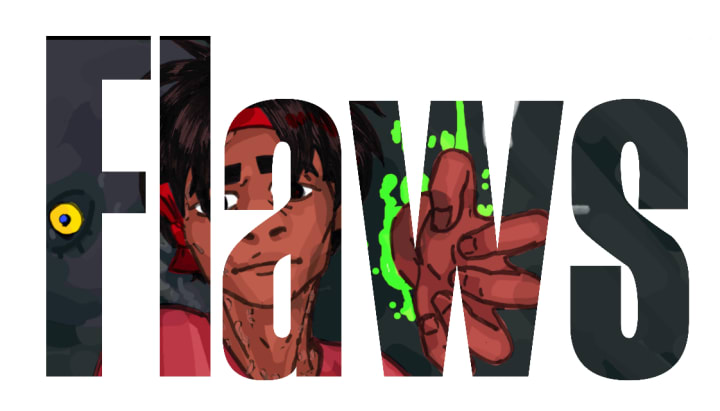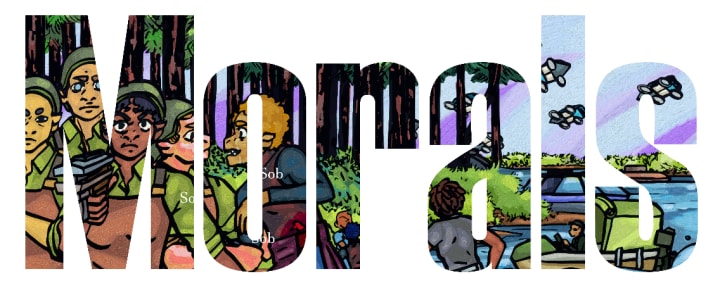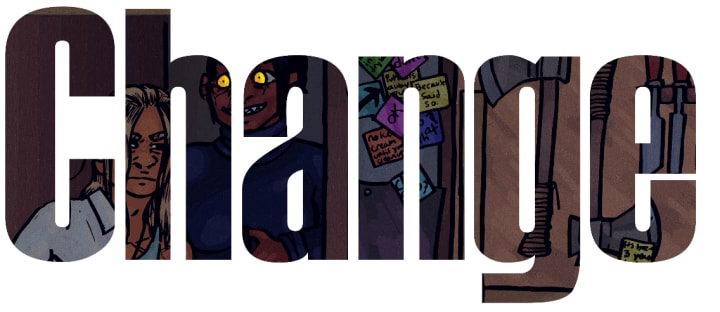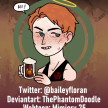Ten Tips for Writing Compelling Characters
A not-so-subtle guide to making your content more engaging.

So you want to write a book, comic or screenplay and all your characters are caricatures of two-dimensional tropes so done to death they’re contributing to global warming. What can you do to freshen things up a bit? Well, here are my ten tips for making your character more compelling.

Conflict. That much should be obvious but if your character is just a lovely nice person who lives in a lovely nice town filled with lovely nice people who would never ever do anything wrong, then bless your heart but your story is less engaging than an LDS romance novel. I don’t care what genre it is, give your character something to fight against. Be it the answer to the fermi paradox come to harvest the biosphere for protein or Susan’s internal struggle with self-doubt, there has to be something to kick off drama and conflict or readers will lose interest.

Motive. This one is twofold. You have to give your character something to fight for and you have to give them the gumption to act. Nobody wants to read about a passive observer that does nothing to change the flow of the story. Often times writers plan out the sequence of events that makes up the novel’s plot and then they have their characters dance along to them with no clear goal or ambition of their own. They do things not because they want to do them but because the plot demands it. Don’t do this. It makes your character flat and unmemorable. Make them live by their motivations and don’t force them to take actions that would be out of character for the sake of the plot. If your character is not strong enough to overcome the antagonizing forces of your book your character isn’t good enough. Change them. If they would easily overcome the obstacles if not for a web of contrivances your obstacles are not good enough, raise the stakes. If you want a compelling story and compelling characters it should be a tossup whether or not they will live or die, win or lose.

Please god, plan this part out before you start writing. You don’t have to know every little detail about your characters’ life from the moment of their conception to the moment of their death but you do have to know the highlights if you want them to seem real. If you don’t know their backstory you can’t know why they would act the way you want them to. In life people always have reasons for their behavior, no matter how bizarre. If Jake is a meth-addicted schizophrenic who thinks the cop pulling him over is a purple elephant and the floor is a writhing swarm of bees, there’s a story as to how he got there. Know that story so you know why he is the way he is so you can intuit how he would realistically react to any given situation.

Flaws. You know this, everybody knows this. Nobody is perfect and those that claim to be are either narcissistic, delusional or lying and have something untoward to gain by their façade of piety. So, as much as you may think that making your character perfect will make everyone love them, the reality is quite the opposite. Nobody will trust them. Nobody will like them and nobody will relate to them. If you want your character to seem real you have to give them flaws, and those flaws have to extend beyond aesthetics. Not plucking your eyebrows isn’t a flaw. It’s a preference. Having a zit isn’t a flaw, it’s a normal part of being human. A flaw is a battered wife projecting her self hatred and suicidality onto her children and assuming that just because she wants to die they must want to die too. A flaw is a high schooler being catty to poor kids because their parents don’t buy them the right brand of glitter jeans. Flaws have direct negative impacts on others. Preferences do not. And if your character doesn’t start with at least one flaw, they will have no room to grow and change over the course of the story and you lose a reliable source of conflict.

Virtues. Just like nobody is perfect, very few people are without virtue. Hitler was an artist and even ex-KGB agents like petting dogs. If you focus too hard on the negative aspects of your character you fail to humanize them. And even dictators are human. This isn’t a matter of justification, collecting trash from the beach doesn’t forgive a serial killer of their crimes but it does add another dimension to their character and if you’re writing a villain, humanizing them lends gravity to their death that wouldn’t exist if they were simply evil for evil’s sake. For protagonists, this tendency manifests in grimdark stories where the self-hatred, joyless repression and hyper-focus on the negative aspects of that character’s actions cause the reader to lose sight of the reason that character is taking those actions in the first place. If all your vigilante does is cry about how horrible it is to kill criminals, one starts to wonder why even kill them in the first place. If you’re going to have a character take extreme actions you have to show some kind of payoff. Gotham has to be improved else batman has no reason to continue being batman.

Moral Grounding. Give your character a list of behaviors they find to be good and a list of behaviors they find to be bad. Give them justifications for each moral presupposition. For example, George thinks people who litter are disrespectful scum because they actively degrade the lives of everyone around them due to chronic laziness and self-absorption. Bob3813 thinks organic life is fundamentally degenerate and morally repugnant because it is self-cannibalizing and deleterious, an incalculable number of conscious beings are created and destroyed every second of every day and their information, what makes them them, is never saved. Their consciousness is cheapened and degraded to the point that it is lesser and more transient than the grains of silica melted to make up one chip on Bob’s memory board. You need to know what your character is repulsed or impressed by on a moral level so you have internal justification for the actions and behaviors they adopt in response to specific behaviors/people. If you don’t have a moral code set out for your character their actions will appear random and inconsequential. Why is Joe kicking that homeless person? Who knows! The author certainly doesn’t, maybe he’s just mean like that. Unless the morals are there to rationalize and to some degree predict a character’s actions it is very difficult for the reader to give a single shit about what happens to them.

Reactions. Unless your character is on a solo mission to alpha-Centauri with her ship filled with frozen embryos and incubators, your character does not live in a bubble. Other characters will react to their behavior and crafting these reactions deliberately is an excellent way of exploring the society your character lives in as well as contextualizing your character’s behavior within it. A man that sails across the ocean with a crew to rape and pillage villages along the coast may be normal in a book about Vikings but plop him onto the deck of the Titanic and you’re going to have some issues. How other characters react to your character can often be more informative than how your character acts in isolation. Be conscious of this fact and use it to your advantage. Because if you don’t and you have every interaction be a cold, rigid exchange existent purely for the sake of the plot, it makes your character and your entire world seem cheap and inauthentic.

Goals. Every character needs to have at least one goal within the narrative. That goal doesn’t and I would argue shouldn’t be the same as the end-goal of the plot. If your character doesn’t have a goal they will have no driving force carrying them forward in the face of adversity and it’s very easy to slip from an active character to a passive one when you don’t know what they want to accomplish. Your character’s goal should be the measure by which they judge the effectiveness of their choices and that measure should be the basis for their morals. If their goal is to overthrow the demon queen, any action taken that furthers their goal can be twisted as a moral action and any action that works against that goal can be interpreted as immoral. That is not to say that your character cannot have morals outside of those formed by a strong belief in a goal (and having conflicting morals can be a good source of internal conflict) but it is an easy mindset for people to slip into. The ends justify the means, essentially. Everyone has at least some inclination in that direction so including that conflict can add to the realism of your story.

Change. Your character needs to change and grow over the course of the story. Their goals can change, their morals can change, their virtues flaws and motives can change. A revenge obsessed serial killer can become a disillusioned horticulturalist when their actions fail to accomplish their goal of making themselves happy and a loving mother may become a revenge obsessed serial killer when her goal of maintaining a happy family is shattered by the negligence of the state resulting in her daughter being killed by an abusive ex out on bail. If your character is static from the beginning to end, unless your story is about the virtues of unwavering dogmatism, it means your character has failed to grow and no lesson has been taught through your narrative. There was just an empty sequence of events so meaningless the subject of those events was entirely unaffected. Don’t do this. Decide what your character should be at the start of the story and what they should be at the end before you start writing so the transition can be planned and gradual. Writing by the seat of your pants and changing them randomly cheapens their growth and it will come off as unjustified and unearned.

Know how your story will end. Know what you’re working towards before you start so you don’t meander pointlessly during the middle of the book trying to figure out what direction you want to take. Knowing this before you start writing will make writing your first draft so much easier than winging it and it allows you to plan your characters arcs carefully around the plot so that the disparity between character growth and the difficulties of the obstacles in their way can be controlled and planned for and then made believable. As mentioned earlier if a character wouldn’t do something, don’t make them do it for the sake of the plot. If splitting up when entering a haunted house would be stupid, don’t make your characters do it. Make the ghosts scary enough that staying together won’t help. Knowing how you want your story to end before starting will make keeping those factors in balance much easier as you can avoid escalating things beyond the point of believability before getting to the climax or not escalating things enough so that the end is shocking and unexpectedly harsh. You might think it’s cool to have a surprise tragic ending and a ham-fisted moral of the story but if you don’t build up to it properly so that it is both believable and expected, the audience will hate you for it. And you don’t want your audience to hate the ending because it will decrease the probability of them supporting your future works or recommending it to others and in a capitalist framework, marketability is everything.
If you liked this post and want to see more of my work check out my comic, articles and social media here: http://linktr.ee/floranb
About the Creator
Floran Bailey
Biologist by day, comic artist by night. Swamp dwelling anarchist all day every day.






Comments
There are no comments for this story
Be the first to respond and start the conversation.